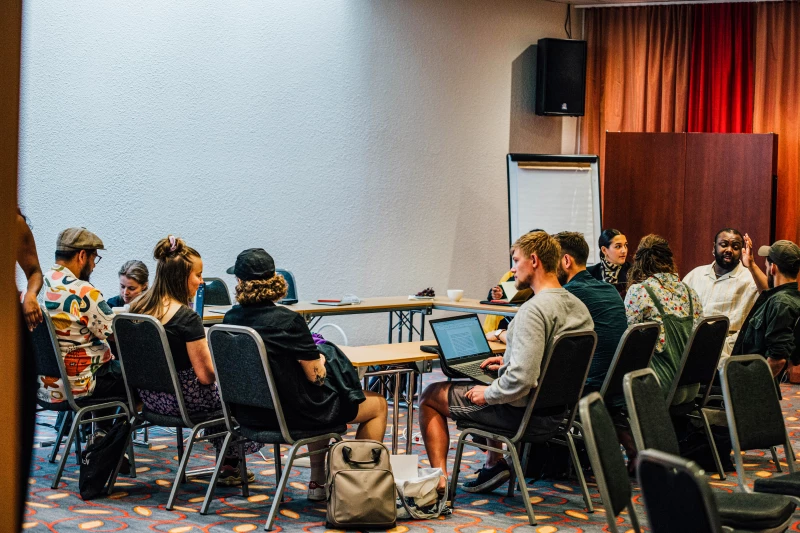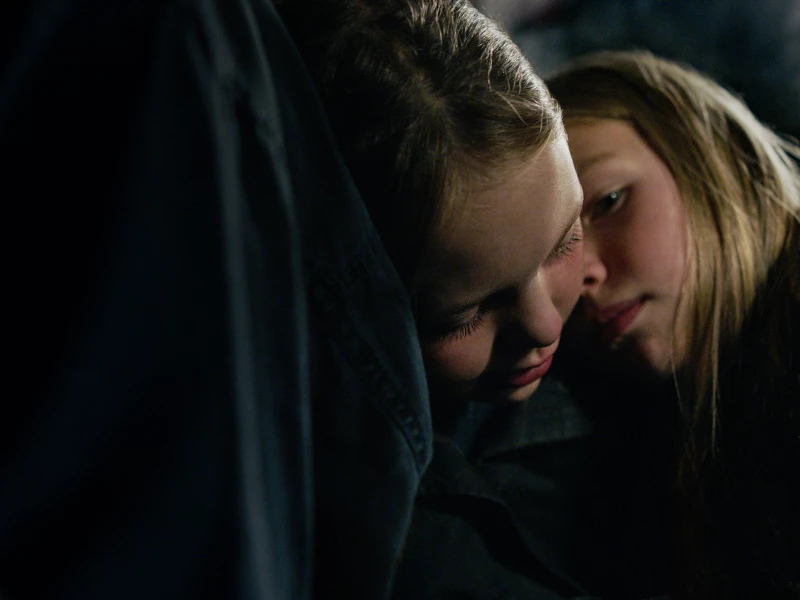
A legacy in 360 degrees
30.08.2023 | Lonely Oaks" cinema release
An extraordinary film - in every respect: almost exactly five years ago, the environmental activists' camps in Hambach Forest were cleared by the police. Film student and journalist Steffen Meyn, who had accompanied the protest movement for many months with his camera, died during the sometimes very chaotic eviction. Three of his fellow students at the time used the 360-degree footage he left behind to make a documentary that will be released in cinemas on 21 September. We spoke to the filmmakers.
"The three of us were good friends of Steffen. We experienced his death on 19 September 2018 in different ways. Jens was at home and received the news via Twitter that a journalist had fallen. Fabiana was on the train to Hambach Forest when she received a call from Jens. Once there, she learnt from a police press conference that the journalist who had fallen had died. Kilian was standing right under the trees when Steffen fell - with new memory cards for Steffen's cameras." This is how the three filmmakers Fabiana Fragale, Kilian Kuhlendahl and Jens Mühlhoff remember the day when Steffen Meyn fell from the treetops 16 metres above the ground and died during the clearing of Hambach Forest. Meyn had repeatedly shown them footage from his time in the camp over the previous months. Thanks to his open, warm manner, he quickly made friends in their tree houses and accompanied the activists with solidarity and criticism at the same time - always remaining an observer.

Meyn actually shot his film as part of a VR project at the Academy of Media Arts Cologne. In the end, it was to become a 360-degree installation in which viewers could move through the camp and the forest themselves. He shot a total of 28 hours of footage with his 360-degree camera, which he always wore mounted on a helmet on his head - plus around 17 hours with a handheld camera. "After his death, we realised very quickly that something had to be done with the material. The only question was in what context," says film student Fabiana Fragale, who is graduating from the art academy in Cologne this year. After the material was given to Meyn's parents, the desire for a larger publication quickly grew - and the decision in favour of the Documentary was made.
"It wasn't easy to sift through the material and see our dead friend every day. Jens from our group took on the job, as he was the furthest away from Steffen," says Fragale. After viewing, the biggest challenge was to convert the 360-degree image into a 16:9 widescreen format: "The material was obviously not designed for cinema exploitation. We had to send the material through various video programmes and then stitch it at the end - in other words, put it together so that it became a 16:9 image," says Kuhlendahl. The image design took place during the editing process. The team only took one angle at a time from the 360-degree video. "This gave us more creative freedom, even if it was technically quite complex," adds Kuhlendahl, who graduated in 2017 and is now working on various film and theatre projects.

It took almost two years to view and make the first rough cut. However, it was important for the context that people from the protest movement with whom Steffen Meyn had contact on site also had their say. "We specifically searched for people who appeared in Steffen's video material. In the end, the search took another two years. That's because many people in the camp wore masks and used false names. So we had to ask our way through the forest piece by piece and also travelled to various climate camps," Fragale reveals. In the end, it was not difficult to persuade the activists to talk about their time with Meyn - many were even happy to be able to talk about their experiences again.

The trio of Directors called in support from Hamburg for the final cut. Editor Ulf Albert brought the interviews and the 360-degree recordings into the final version. Hamburg-based Roland Musolff (Musolff Studio) took care of the colour grading and sound design. The soundtrack for the film, on the other hand, was created in Cologne by Caroline Kox and Antonio de Luca: "The soundtrack was not intended to be emotional, but only to emphasise the mood in the forest. For example, we worked with howling tubes to create a wind-like sound," says Fabiana Fragale. "Lonely Oaks" was produced by Made in Germany Filmproduktion - contact with Executive Producer Melanie Andernach was established via university professor Ingo Haeb, who was involved in the project from the very beginning.
In spring 2023, "Lonely Oaks" celebrated its world premiere at the Berlinale - and received consistently positive reviews from all sides. "We would never have thought that. The film wasn't finished when we submitted it. When we got the news that it was being shown in Berlin, it was kind of absurd. Because it was a film about a dead friend. We never wanted to make a career out of it. We wanted to tell the story of what was important to Steffen," says Fragale.
And what was important to him? Steffen Meyn had an unshakeable belief that people can and should treat each other well. In his view, conflicts had to be resolved, not won. He followed exactly this idea during his involvement in the filming. You can find out what that looks like in the cinema from 21 September.
more articles









-1703683844.png?fit=max&w=800&h=724&q=90&fm=webp)